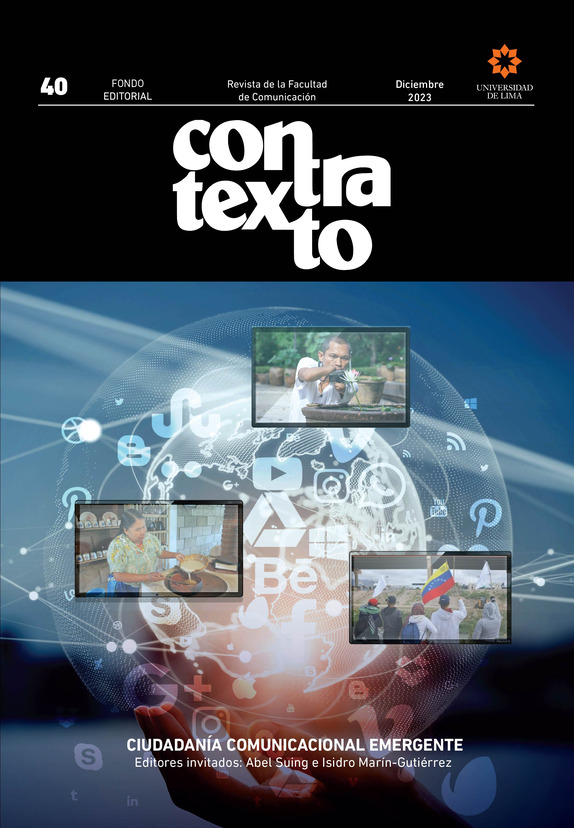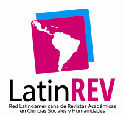The SDGs in sustainability reports among companies in Ecuador, Colombia, and Chile
DOI:
https://doi.org/10.26439/contratexto2023.n40.6440Keywords:
Sustainable Development Goals, enterprise, Chile, Colombia, EcuadorAbstract
The Sustainable Development Goals (SDGs) linked to the 2030 Agenda have been widely accepted by public and private companies, with many choosing to incorporate them within the framework of their social responsibility initiatives. This research article aims to find out how the SDGs are reflected in corporate sustainability reports and in which business activities they stand out the most. To this end, using a sequential explanatory methodology, the authors analyzed 12 sustainability reports issued in 2021 by large companies in Colombia, Chile, and Ecuador to verify their alignment with the SDGs. The reports showed evidence of a diverse range of programs associated with at least three SDGs, thus highlighting the importance of fulfilling not only the needs based on each company’s field of expertise but also those of its audiences and the community in general. The most prevalent SDGs were “decent work and economic growth” (SDG 8) and “gender equality” (SDG 5), followed by “responsible consumption and production” (SDG 12). This paper contributes to a growing interest among academia in the research on sustainability communication evidenced in annual reports.
Downloads
References
Abeysekera, I. (2022). A framework for sustainability reporting. Sustainability Accounting, Management and Policy Journal, 13(6), 1386-1409. https://doi.org/10.1108/SAMPJ-08-2021-0316
Acevedo, J. P., & Piñeros, R. A. (2019). Evolución del Reporteo en Sostenibilidad en Latinoamérica bajo los lineamientos del GRI (Global Reporting Initiative). SIGNOS – Investigación en Sistemas de Gestión, 11(2), 63-82. https://doi.org/10.15332/24631140.5082
Adams, C. A., Druckman, P. B., & Picot, R. C. (2020). Sustainable development goals disclosure (SDGD) Recommendations. ACCA, Chartered Accountants ANZ, ICAS, IFAC, IIRC and WBA. https://bit.ly/3JqjjPN
Andréu, J. (2002). Técnicas de análisis de contenido: Una revisión actualizada. Centro de Estudios Andaluces. https://shorturl.at/dhiAF
Argos. (2021). Reporte integrado 2021. https://bit.ly/42tHt2b
Banco Guayaquil. (2021). Reporte integrado 2021. https://bit.ly/3CnvkkI
Bancolombia. (2021). Informe de gestión 2021. https://bit.ly/43FjNcm
Bardin, L. (1996). Análisis de contenido. Ed. Akal.
Baviera-Puig, A., García-Martínez, G., & Gómez-Navarro, T. (2014). Propuesta metodológica mediante ANP para la evaluación de las memorias de sostenibilidad del sector agroalimentario español. Economía Agraria y Recursos Naturales, 14(1), 81-101. https://doi.org/10.7201/earn.2014.01.04
Beyne J., Visser, W., & Allam, I. (2021). Sustainability reporting in the Antwerp port ecosystem, Belgium: Understanding the relationship between reporting on the sustainable development goals and integrated thinking. Frontiers in Sustainability (2), 689739. https://doi.org/10.3389/frsus.2021.689739
Boiral, O., Heras-Saizarbitoria, I., & Brotherton, M. C. (2019). Assessing and improving the quality of sustainability reports: The auditors’ perspective. Journal of Business Ethics, 155, 703–721. https://doi.org/10.1007/s10551-017-3516-4
Carrillo-Punina, A. P., & Galarza-Torres, S. P. (2022). Reportes de sostenibilidad de organizaciones sudamericanas. Ciencias Administrativas, (20), 103. https://doi.org/10.24215/23143738e103
Celulosa Arauco y Constitución. (2021). Reporte de sostenibilidad 2021. http://bit.ly/45QMhBs Cho, C. H., & Patten, D. M. (2007). The role of environmental disclosures as tools of legitimacy: A research note. Accounting, Organizations and Society, 32(7), 639–647. https://doi.org/10.1016/j.aos.2006.09.009
Colbún. (2021). Memoria integrada 2021. https://bit.ly/3IYfb9q
Comisión Económica para América Latina y el Caribe. (2018). Segundo informe anual sobre el progreso y los desafíos regionales de la Agenda 2030 para el Desarrollo Sostenible en América Latina y el Caribe. CEPAL. https://bit.ly/3CBzNAN
Comisión Económica para América Latina y el Caribe. (2019). Informe de avance cuatrienal sobre el progreso y los desafíos regionales de la Agenda 2030 para el Desarrollo Sostenible en América Latina y el Caribe. CEPAL. https://bit.ly/44TWdcb
Comisión Económica para América Latina y el Caribe. (2022). Una década de acción para un cambio de época. CEPAL. https://bit.ly/3CgLA7p
Consejo Nacional para la Implementación de la Agenda 2030 para el Desarrollo Sostenible. (2017). Informe de diagnóstico e implementación de la Agenda 2030 y los objetivos de desarrollo sostenible en Chile. https://www.chileagenda2030.gob.cl/storage/docs/Diagnostico-Inicial_2.0_Agenda2030-ODS_2017.pdf
Corporación Eléctrica del Ecuador. (2021). Memoria de sostenibilidad 2021. https://celecloud.celec.gob.ec/s/yC9ebz8gHpT5JXd
Durán, A. M., Vega, M., Matus, P., Orozco-Toro, J. A., & Ávila, C. (2021a). Influencia de la cultura nacional en la gestión de comunicación para la sostenibilidad. Cuadernos. Info, (47), 184-210. https://doi.org/10.7764/cdi.47.1859
Durán, A. M., Vega, M., Orozco, J. A., Retamal, L., & Ávila, C. (2021b). Vínculo entre responsabilidad social y comunicación en países de América Latina: Estudio aplicado en empresas de Ecuador, Colombia y Chile. Prisma Social: revista de investigación social, (35), 141-164. https://revistaprismasocial.es/article/view/4480
Ecopetrol (2021). Reporte integrado de gestión sostenible 2021. https://bit.ly/3EDZilP
Farisyi, S., Musadieq, M. A., Utami, H. N., & Damayanti, C. R. (2022). A systematic literature review: Determinants of sustainability reporting in developing countries. Sustainability, 14(16), 10222. https://econpapers.repec.org/article/gamjsusta/v_3a14_3ay_3a2022_3ai_3a16_3ap_3a10222-_3ad_3a890619.htm
Ferré, C., & Orozco, J. (2011). El diálogo entre empresas de comunicación y sus stakeholders en América y Europa. Cuadernos.info, (29), 91-104. https://doi.org/10.7764/cdi.29.239
Garro, I. (2019). Hacia un nuevo multilateralismo que impulse los ODS. In: Gobierno de España (Ed.), La Agenda 2030 y los ODS: nueva arquitectura para la seguridad (pp. 67-90) https://www.dsn.gob.es/sites/dsn/files/LA%20AGENDA%202030%20Y%20LOS%20ODS.pdf
Global Reporting Initiative. (2018). Business reporting on the SDGs. https://www.globalreporting.org/public-policy-partnerships/sustainable-development/integrating-sdgs-into-sustainability-reporting/
Global Reporting Initiative. (2022). Why report? https://www.globalreporting.org/how-to-use-the-gri-standards/
Grueso-Gala, M., & Camisón, C. (2022). A bibliometric analysis of the literature on non-financial information reporting: Review of the research and network visualization. Cuadernos de Gestión, 22(1), 175-192. https://doi.org/10.5295/cdg.211545mg
Grupo Nutresa (2021). Reporte integrado 2021. https://bit.ly/45Sbew7
Hengst, I. A., Jarzabkowski, P., Hoegl, M., & Muethel, M. (2020). Toward a process theory of making sustainability strategies legitimate in action. Academy of Management Journal, 63(1), 246-271. https://doi.org/10.5465/amj.2016.0960
Hernández, R., Fernández, C., & Baptista, P. (2014). Metodología de la investigación (6th ed.). McGraw Hill Interamericana. https://cmapspublic2.ihmc.us/rid=1M7BV0046-FSY1Y8-1PHY/Yarliz%20Mora.pdf
Herrera, J., Larrán, M., Lechuga, M., & Martínez, D. (2013). Determinantes de la publicación de memorias de RS en las pequeñas y medianas empresas: ¿una cuestión de imagen? Prisma Social: revista de investigación social, (10), 271-302. https://www.redalyc.org/articulo.oa?id=353744534008
Herrera, R. (2022). Comunicação, Agenda 2030 da ONU e Organizações. Organicom, 19(39), 131-144. https://doi.org/10.11606/issn.2238-2593.organicom.2022.198084
Ikram, M., Zhang, Q., Sroufe, R., & Ferasso, M. (2020). The social dimensions of corporate sustainability: An integrative framework including COVID-19 insights. Sustainability, 12(20), 8747. https://www.mdpi.com/2071-1050/12/20/8747
Kazemikhasragh A., Cicchiello A., & Pietronudo M. (2021) Factors influencing the adoption of SDG reporting by large African and Asian companies. International Journal of Technology Management & Sustainable Development, 20(1), 43-60. https://doi.org/10.1386/tmsd_00034_1
Knox, B. D. (2020). Employee volunteer programs are associated with firm-level benefits and CEO incentives: Data on the ethical dilemma of corporate social responsibility activities. Journal of Business Ethics, 162, 449-472. https://doi.org/10.1007/s10551-018-4005-0
KPMG. (2022). Big shifts, small steps. Survey of dustainability reporting 2022. https://bit.ly/45QewQJ
Krippendorff, K. (1990). Metodología de análisis de contenido: teoría y práctica. Grupo Planeta. https://books.google.com.pe/books/about/Metodolog%C3%ADa_de_an%C3%A1lisis_de_contenido.html?hl=es&id=LLxY6i9P5S0C&redir_esc=y
Kunsch, M. M. K. (2022). Estratégias comunicativas nos processos de parcerias para implementação da Agenda 2030 da ONU. Organicom, 19(39), 16-31. https://doi.org/10.11606/issn.2238-2593.organicom.2022.200234
Lee, S. H., & Zhou, Y. (2022). The outlook for sustainable development goals in business and management: A systematic literature review and keyword cluster analysis. Sustainability, 14(19), 11976. https://doi.org/10.3390/su141911976
Llanos-Herrera, G. R., & Andrade-Valbuena, N. A. (2022). Organization theory as applied to the big problems of the marketing and sustainability industry. In R. I. Perez-Uribe, C. Salcedo-Perez, & A. Carvajal-Contreras (Eds.), Handbook of research on organizational sustainability in turbulent economies (pp. 196-212). IGI Global. https://doi.org/10.4018/978-1-7998-9301-1.ch011
Martínez-Ferrero, J., & García-Sánchez, I.-M. (2017). Sustainability assurance and cost of capital: Does assurance impact on credibility of corporate social responsibility information? Business Ethics: A European Review, 26(3), 223-239. https://doi.org/10.1111/beer.12152
Matus, P. I. (2018). Comunicación y sostenibilidad en Chile: desde la filantropía hasta la relación con las comunidades. In Ferrari M. A., & Durán, A. M. (Eds.), Tejiendo sustentabilidad desde la comunicación en América Latina (pp. 131-150). CIESPAL. https://repositorio.uc.cl/handle/11534/22751
Naciones Unidas (2018). La Agenda 2030 y los objetivos de desarrollo sostenible: una oportunidad para América Latina y el Caribe (LC/G.2681-P/Rev.3). https://bit.ly/45Ic3Yt
Nason, R. S., Bacq, S., & Gras, D. (2017). A behavioral theory of social performance: Social identity and stakeholder expectations. Academy of Management Review, 43(2), 259-283. https://doi.org/10.5465/amr.2015.0081
Pizzi, S., Caputo, A., Corvino, A., & Venturelli, A. (2020). Management research and the UN sustainable development goals (SDGs): A bibliometric investigation and systematic review. Journal of Cleaner Production, (276), 124033. https://doi.org/10.1016/j.jclepro.2020.124033
Repsol. (2021). Informe de gestión integrado. https://bit.ly/48hg08g
Retamal-Ferrada, L. (2020). ¿Desarrollo sostenible o sustentable? Estudio de las memorias de sostenibilidad de la industria energética en Chile. In L. G. Duquino, & S. Nail (Eds.), Sustentabilidad y conciencia ambiental urbana en Abya Yala (Latinoamérica) (pp. 53-87). Editorial Uniagustiniana. https://doi.org/10.28970/9789585498457.02
Reynolds, M., & Yuthas, K. (2008). Moral discourse and corporate social responsibility reporting. Journal of Business Ethics, 78(1), 47-64. https://doi.org/10.1007/s10551-006-9316-x
Rodrigo-Cano, D. Picó, M. J., & Dimuro, G. (2019). Los objetivos de desarrollo sostenible como marco para la acción y la intervención social y ambiental. Retos Revista de Ciencias de la Administración y Economía, 9(17), 25-36. https://doi.org/10.17163/ret.n17.2019.02
Rodríguez, J. A. (2020). Reportes de sostenibilidad en empresas grandes: ¿Cómo involucrar a más empresas en la implementación de prácticas y reporte de sostenibilidad en Ecuador? CEMDES–ESPAE. https://cemdes.org/wp-content/uploads/2021/02/DIAGNOSTICO-REPORTING2020.pdf
Rosati, F., & Faria, L. G. D. (2019a). Addressing the SDGs in sustainability reports: The relationship with institutional factors. Journal of Cleaner Production, 215, 1312–1326. https://doi.org/10.1016/j.jclepro.2018.12.107
Rosati, F., & Faria, L. G. D. (2019b). Business contribution to the dustainable development agenda: Organizational factors related to early adoption of SDG reporting. Corporate Social Responsibility and Environmental Management, 26(3), 588-597. https://doi.org/10.1002/csr.1705
Ruiz-Mora, I. M. (2012). Las relaciones con los públicos y su reflejo en las memorias de responsabilidad social. Revista Internacional de Relaciones Públicas, 2(4), 173-200. http://hdl.handle.net/10630/5223
Sachs, J. D., Schmidt-Traub, G., Mazzucato, M., Messner, D., Nakicenovic, N., & Rockström, J. (2019). Six transformations to achieve the sustainable development goals. Nat Sustain (2), 805-814. https://doi.org/10.1038/s41893-019-0352-9
Semenova, N. (2023). The public effect of private sustainability reporting: Evidence from incident-based engagement strategy. Journal of Business Ethics, 182(2), 559-572. https://doi.org/10.1007/s10551-021-05007-8
Sierra-García, L., García-Benau, M. A., & Bollas-Araya, H. M. (2018). Empirical analysis of non-financial reporting by Spanish companies. Administrative Sciences, 8(3), 29. https://doi.org/10.3390/admsci8030029
Sodimac Chile. (2021). Reporte de sostenibilidad. https://sodimac.falabella.com/sodimac-cl/page/reportes-de-sostenibilidad
Threlfall, R., King, A., Schulman, J., & Bartels, W. (2020). The time has come. The KPMG Survey of Sustainability Reporting 2020. https://assets.kpmg.com/content/dam/kpmg/be/pdf/2020/12/The_Time_Has_Come_KPMG_Survey_of_Sustainability_Reporting_2020.pdf
UNACEM Ecuador. (2021). Reporte integrado 2021. https://bit.ly/3t2kW0k
United Nations. (2015). Transforming our world: the 2030 Agenda for Sustainable Development. https://sdgs.un.org/2030agenda
United Nations Global Compact. (n.d.). Global goals for people and planet. https://unglobalcompact.org/sdgs/about
Valenzuela, L., Jara-Bertin, M., & Villegas, F. (2015). Prácticas de responsabilidad social, reputación corporativa y desempeño financiero. Revista de Administração de Empresas, 55(3), 329-344. https://doi.org/10.1590/S0034-759020150308
Villegas, F., Valenzuela-Fernández, L., Llonch, J., & López, P. (2022). Environmental sustainability and their factors in SMEs: A multiple case study of Spain and Chile. Cuadernos de Gestión, 22(1), 35-50. https://doi.org/10.5295/cdg.211370fv
Walmart Chile. (2021). Reporte de sostenibilidad 2021. https://bit.ly/43LPqRB
Whittingham, K. L., Earle, A. G., Leyva-de la Hiz, D. I., & Argiolas, A. (2022). The impact of the United Nations sustainable development goals on corporate sustainability reporting. BRQ Business Research Quarterly, 26(1), 45-61. https://doi.org/10.1177/23409444221085585
Published
Issue
Section
License
All of the works published are licensed under a CC BY 4.0 Creative Commons Attribution license. (updated on March 1st 2021)
The content of the journal may be shared in any material or format. The content may be adapted, contributed upon and transformed. Both possibilities are only permitted in so far as they complete the following conditions:
- Attribution: Credit must be given where it is due, a link to the license must be provided and changes, if made, must be indicated. This should be done in the manner deemed appropriate, without suggesting that the licensor promotes you or your use of the material.
Ownership rights
The patrimonial rights for Contratexto are published under a Creative Commons BY 4.0 license, allowing authors to keep the patrimonial rights to their work without restrictions.
If a work published in Contratexto were to be copied, distributed, spread, or any other activities contemplated in the aforementioned license, the author(s) and the journal must be mentioned visibly and expressly.
Self-archive
This journal allows and encourages authors to post items submitted to the journal on personal websites or institutional repositories both prior to and after publication, while providing bibliographic details that credit, if applicable, its publication in this journal.





















